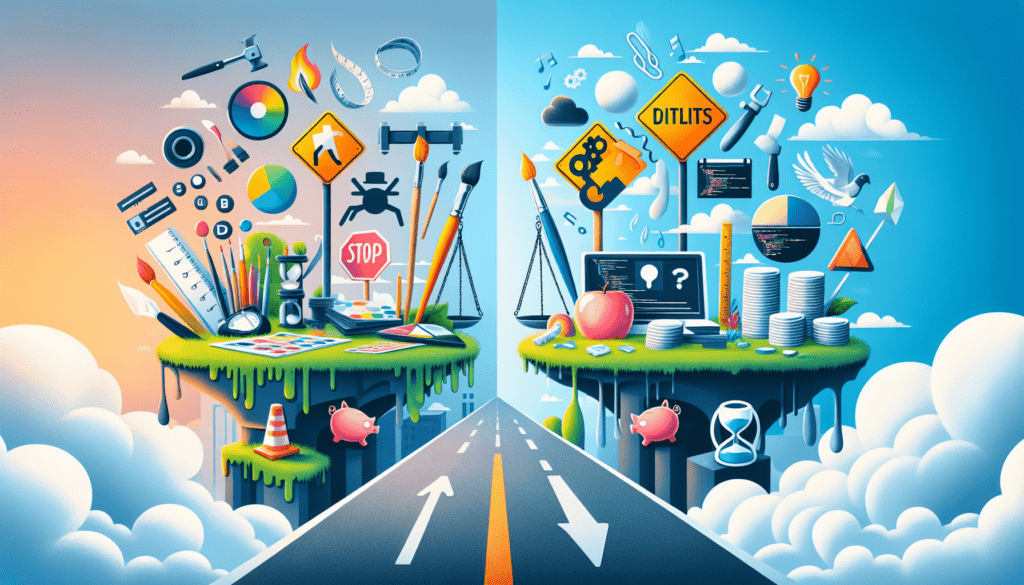So, you’ve decided to take on the task of creating your own website. It can be an exciting and empowering journey, but like any DIY project, there are pros and cons to consider. In this article, we’ll explore the advantages and disadvantages of DIY website creation, helping you make an informed decision on whether it’s the right path for you. Whether you’re a small business owner, a blogger, or simply someone looking to showcase your talents online, understanding the potential benefits and drawbacks will enable you to navigate this digital landscape with confidence.

Pros of DIY Website Creation
Cost effective
Creating your own website can be a cost-effective option compared to hiring a professional web developer. When you embark on a DIY website creation journey, you have the opportunity to save a significant amount of money. With DIY platforms and templates readily available online, you can create a functional website without the need for expensive software or professional services.
Creative control
One of the major advantages of designing your website on your own is the creative control it offers. You get to decide the overall look and feel of your website, including the layout, color scheme, font styles, and imagery. This level of control allows you to showcase your brand’s personality and create a unique online presence that reflects your vision accurately.
Flexibility
DIY website creation provides you with the flexibility to make changes and updates whenever you want. Whether it’s adding new content, updating images, or tweaking the design elements, you have the power to modify your website’s appearance and functionality without relying on a third-party. This flexibility allows you to adapt your website to the evolving needs of your business or personal brand.
Faster turnaround time
Creating a website from scratch can be a time-consuming process, especially if you are new to web design. However, with DIY website creation tools and templates, you can significantly reduce the amount of time it takes to launch your site. These tools often come with pre-designed layouts and features, enabling you to quickly customize and upload content. This expedited turnaround time ensures that you can get your website up and running in no time.
Independence
Building your own website gives you complete independence and full ownership of your digital presence. You are not reliant on a web developer or agency to make updates or changes to your site. Instead, you have the control and autonomy to manage and maintain every aspect of your website. This level of independence allows you to be agile and responsive, ensuring that your online presence aligns with your goals and objectives.
Cons of DIY Website Creation
Learning curve
While DIY website creation offers many benefits, it is crucial to acknowledge that there is a learning curve involved. If you are new to web design and development, you may encounter challenges while navigating through the various tools and features. Acquiring the necessary skills and knowledge to create a professional-looking website may require time and effort. However, with dedication and perseverance, you can overcome this learning curve and develop the necessary skills.
Limited expertise
Unlike professional web developers, you may have limited expertise in terms of creating complex and custom functionalities. DIY website creation tools often provide pre-designed templates and limited customization options. Therefore, if you have specific requirements for your website, such as advanced e-commerce features or intricate integrations, you may face limitations when creating your site on your own. In such cases, seeking professional assistance or considering alternative website creation options might be necessary.
Template limitations
While website templates can serve as a great starting point, they also come with inherent limitations. These templates are designed to cater to a wide range of businesses and industries, which means they may not perfectly align with your specific needs or niche. Customizing and personalizing the templates to create a unique look can be challenging, especially if you desire a highly customized website design. It’s important to carefully consider the limitations of templates and ensure they meet your requirements before committing to a DIY website creation approach.
Lack of professional touch
While DIY website creation can result in a visually appealing website, it may lack the professional touch that comes with hiring a skilled web developer. Professionals have the experience and expertise to create websites that are not only aesthetically pleasing but also optimized for user experience and search engine visibility. If your website is a crucial part of your business or brand, investing in professional assistance may provide you with a more polished and refined online presence.
Maintenance and updates
Creating a website is just the beginning; ongoing maintenance and regular updates are necessary to ensure your site remains functional and up-to-date. DIY website creation means that you are responsible for these tasks, which can be time-consuming and technically challenging. From keeping plugins and software up to date to addressing security vulnerabilities, website maintenance requires a certain level of expertise. It’s important to consider the ongoing commitment required to keep your website running smoothly before deciding on a DIY approach.
In conclusion, DIY website creation offers numerous advantages, including cost-effectiveness, creative control, flexibility, faster turnaround time, and independence. However, it also comes with its share of challenges, such as a learning curve, limited expertise, template limitations, lack of a professional touch, and the responsibility of ongoing maintenance. By carefully weighing the pros and cons and considering your specific needs and skills, you can make an informed decision about whether DIY website creation is the right choice for you.











